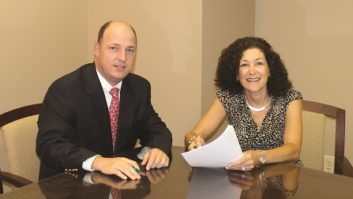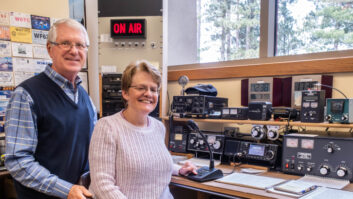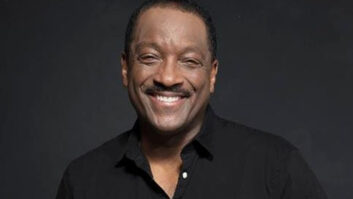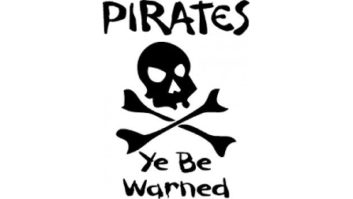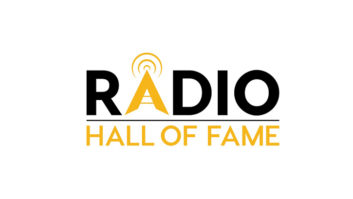Some Enlist Governments in Battle With FCC
WASHINGTON Some pirate broadcasters resisting FCC efforts to shut them down are enlisting support of local elected leaders to keep their unlicensed stations on the air.
Radio activists say resolutions passed by local governing boards are unlikely to change national policy but highlight a growing feeling of powerlessness that they feel communities have over the inability to hear local voices on the radio.
“It’s logical that people in local communities don’t understand why the (federal) government won’t give them licenses for stations,” said Michael Bracy, executive director of the Low Power Radio Coalition.
Although such resolutions do not seem to constitute a trend, pirate broadcasters have, in some cases, succeeded in winning the backing of local leaders, said Pete Tridish, a community radio activist, former Philadelphia pirate and a staffer of the pro-LPFM Prometheus Radio Project.
Licensed radio broadcasters say pirates are breaking the law and interfering with licensed stations. They argue that the FCC needs to continue efforts to crack down on the scofflaws.
Support
This summer, local government bodies in two California cities, San Francisco and Santa Cruz, passed resolutions citing some of those concerns and stating their support of pirate radio stations. The unanimous votes came on the heels of visits to the stations by FCC Enforcement Bureau field staff.
A third station in Vermont, days after the FCC attempted to confiscate its broadcasting equipment, was trying to get back on the air and obtain support from local government leaders for the station.
A source in the FCC Enforcement Bureau declined to comment on the pending investigations and could not offer details about the steps the FCC will take to shut down the stations. The cases, the source said, would follow normal procedures for handling unlicensed broadcasters.
The agency follows a process that begins with a warning to the unlicensed operators, asking them to cease broadcasting within 10 days. If stations do not comply, ensuing steps include fines, another visit from FCC field staff accompanied by U.S. marshals to confiscate equipment, and, finally, criminal prosecution.
In 2001, the FCC Enforcement Bureau shut down 184 unlicensed FM operations; it closed 158 in 2002. During the first quarter of 2003, bureau staff closed 85 operations, a noticeable rise in the enforcement rate. The agency has not yet determined a cause for the apparent increase, said the source.
San Francisco Liberation Radio
According to so-called “free radio” broadcasters, if more unlicensed, volunteer-run stations gain the support of communities, and if the debate on the new media ownership rules continues in Congress and the nation, FCC policies stand to be challenged by citizens seeking a voice in their towns and cities.
Community support for free radio stations, supporters say, gives strength to their argument for diversity and localism, which they allege are lacking in the mainstream radio industry, a charge NAB says is untrue.
For many unlicensed operators, the community support is symbolic.
“(The city’s resolution) will not compel the FCC to do anything,” said Sarah Olson, a DJ at San Francisco Liberation Radio, which airs on 93.7 MHz and online. More important, she said, “It galvanized the community.”
Enforcement Bureau field staff delivered a notice to SFLR in July stating it was operating without a license in violation of FCC rules. The agency issued the notice after attempting to seize the station’s equipment without success. Olson said the DJ working at the station at the time would not let the field staff enter the station to inspect the equipment. In mid-October, the FCC raided the station and shut it down. The agency would not discuss whether those running the station would be fined.
Earlier, the city’s Board of Supervisors passed a resolution asking the FCC and the city and county of San Francisco to not interfere with the functioning of the station. The resolution included language that urged federal, state and local officials to support policies and practices that encourage diverse local noncommercial media and calling for the FCC to roll back the relaxation of its media ownership rules.
“The resolution contributed to the great debate of who owns media,” Olson said.
The San Francisco resolution, Olson said, was based on a similar measure passed in Seattle last March that supported diversity in media ownership. The resolution also addressed the issue of whether former pirates would be eligible to license LPFMs.
Because the decision to forbid former pirates from LPFM is in the courts, and a decision about whether third — adjacent — channel protections truly are needed for LPFM is in limbo, she said, it is not fair for the FCC “to hold up broadcasting until those issues are settled. As long as it is not settled entirely, it prohibits people like us from applying for a license.”
‘Rhetoric’
Many broadcasters do not agree.
“A lot of these people hide behind rhetoric,” said Mark Powers, vice president of the California Broadcasters Association. “It’s really about anti-authority. Even if you told them to stop now and they could become legitimate, it would ruin the foundation they were in business for in the first place.”
The California Broadcasters Association does not view local government support of pirate broadcasters as problematic, because those jurisdictions have no authority in the area of broadcast regulation.
Fewer communities, Powers said, support pirates now thanks to the presence of the new authorized low-power FM service, which, he said, has met the need for community radio and eliminated many unlicensed operations. After the creation of LPFM, the association stopped keeping track of the number of interference complaints California broadcasters lodged against unlicensed broadcasters.
Powers discounts the view that licensed broadcasters are not meeting the needs of communities. If listeners were really interested in pirate radio, he said, the audience would have grown beyond “the couple people listening.”
“In the end, the audience drives broadcasting. Broadcasting does not drive the audience,” said Powers.
The FCC has yet to approve any LPFM applications filed by former pirates while the licensing issue continues to be debated in the courts. In 2002, a federal appeals court in Washington ruled that the ban on former pirates as LPFM operators is unconstitutional but decided that the FCC may reject pirates on a case-by-case basis. In May 2002, the same circuit court agreed to rehear the case following a request by the FCC.
In July of this year, the FCC released the results of a study by the Mitre Corp., which concludes that many LPFM stations could be operated on third — adjacent channels with respect to full — power FM stations. Broadcasters were preparing comments opposing the methodology of the study in October.
Olson said San Francisco Liberation Radio filed applications for licenses twice in the past, once in the mid-1990s and again during the LPFM license window. Both applications were rejected. Olsen did not know why; the rejections predated her association with the station.
She said the station has been broadcasting in the San Francisco area since 1993 without any interference complaints. Operating with 100 watts, SFLR airs music and programming, including commentary opposing the continuing war in Iraq.
San Francisco Supervisor Matt Gonzalez, president of the board of supervisors, developed the city’s resolution supporting SFLR and believes that taking a stand will be beneficial.
“For us, it just seems very natural to not be frightened of speech, and in this case, the alternative press that’s trying to get a message out to folks,” he said.
Olson said SFLR is waiting for a response from the FCC to a letter it sent citing the unresolved issues of allowing former pirates to apply for licenses and keeping the third-adjacent channel protections. Meanwhile, she said, SFLR will continue to seek community support for the station and is considering whether to take the issue to the state level.
Free Radio Santa Cruz
SFLR’s campaign for state support may be aided by another city that issued its support for pirate radio.
In September, “Free Radio Santa Cruz” at 96.3 MHz successfully lobbied the Santa Cruz City Council to pass a resolution urging the federal government to stop threatening to close the music, news and public affairs station.
In August, FCC field agents tried to gain access to the radio and Web streaming station but could not. The agents left a notice that the station was broadcasting without a license, stating that transmissions from the location were interfering with broadcast television, said a DJ who calls himself Skidmark Bob.
Also known as Freak Radio, the station has a Web site on which it boasts it is “proving FCC incompetence 24 hours a day, 7 days a week,” and has been on the air “eight years without a license.”
According to Skidmark Bob, it is the second time Freak Radio has received the support of the city council. Like San Francisco, the Santa Cruz resolution also urges federal, state and local officials to support policies and practices that encourage diverse local noncommercial media. In 1999, the council approved a statement supporting the station.
Duran said the station has received numerous visits by the FCC and has always evaded an equipment seizure by the agency. “It would be really bad to raid us,” he said. “We have so much community support. We get donations.”
In September, 25 people turned out at an emergency session called by the city council about the station, he said, adding that the members passed the measure unanimously and in it, recognized Freak Radio broadcasters for going “to great lengths to ensure that their equipment operators without causing harmful interference with any other radio signal.”
Once, the station switched frequencies after a local public station complained to the FCC about interference.
Santa Cruz Vice Mayor Scott Kennedy said it is critical that communities take a stand for independent media.
“Radio and television outlets are increasingly controlled by a very large corporations,” he said. Though Free Radio Santa Cruz programmers have criticized the council during broadcasts, “it makes it more important to support the resolution. Free speech isn’t predicated on agreement.”
Duran said the station’s whole premise is “having our own free speech.” He said the 30 volunteers who run the station have never applied for a low-power FM license and will never do so. “We never wanted to be licensed,” Duran said. “We don’t want any censorship, inspections or the FCC telling us how to run things.”
Free Radio Burlington
Other pirate radio broadcasters say that the commission is not supporting the public’s wishes by encouraging a diversity of media. The LPFM process, said Free Radio Burlington collective member Patrick Johnson, was unfair because the five-day filing window was too short and that the entire process has proceeded slowly. The station airs at 87.9 MHz.
The Peace and Justice Center, a Burlington-based nonprofit group, filed for an LPFM application two-and-a-half years ago. According to Johnson, the Center has not received a response from the FCC because the application conflicted with another from the Vermont Department of Transportation, which filed three-quarters of the 20 applications filed by Burlington groups.
Over two years ago, Free Radio Burlington launched a community-based radio station, similar to the type that was going to be provided by Peace and Justice Center, he said. For the first time, in September, FCC field agents tried to inspect the station’s location.
Although they found no transmitting equipment at the site, field agents gave a warning for the station to get off the air within 10 days. Prepared for such a visit, Johnson said other collective members took away the computer equipment used to stream the station’s broadcasts to its transmitter a half-mile away from the station to avoid confiscation.
Now the station is working to get back on the air and streaming on its Web site. Johnson said he and fellow collective members are working on gaining community support.
Free Radio Burlington expects to get the support of its city leaders within the next six months. Johnson is assured the station will get a favorable response. “We’re trying to be a community asset, not an eyesore,” he said. “(The station) is something that the council members can use at election time.”
The collective members say they also are considering how to address their grievances before the FCC. “We’ve talked about the possibility of filing a lawsuit for not representing the people they’re serving,” Johnson said. “We don’t have enough money for it, but we’ll build up community support and do it. Until them, we’ll keep broadcasting.”
One of Free Radio Burlington’s other goals is to start up classes for Vermont residents interested in launching pirate radio stations. “We think pirate radio is on the rise,” he said. “If a community desires a station run by the public for the public … (we want) to help.”





